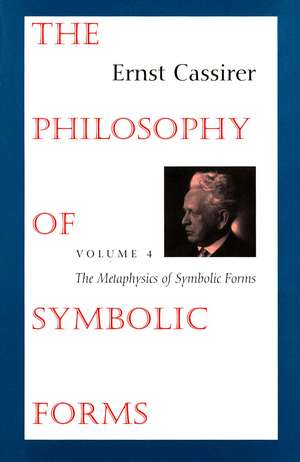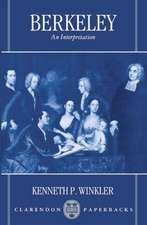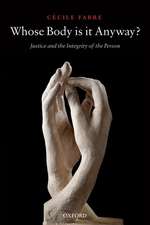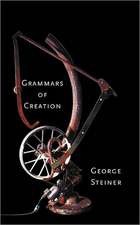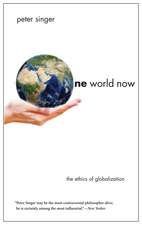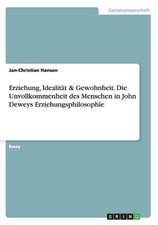The Philosophy of Symbolic Forms: Volume 4: The Metaphysics of Symbolic Forms
Autor Ernst Cassirer Editat de John Michael Krois, Donald Phillip Vereneen Limba Engleză Paperback – 21 ian 1998
At his death in 1945, the influential German philosopher Ernst Cassirer left manuscripts for the fourth and final volume of his magnum opus, The Philosophy of Symbolic Forms. John Michael Krois and Donald Phillip Verene have edited these writings and translated them into English for the first time, bringing to completion Cassirer's major treatment of the concept of symbolic form.
Ernst Cassirer believed that all the forms of representation that human beings use—language, myth, art, religion, history, science—are symbolic, and the concept of symbolic forms was the basis of his thinking on these subjects. In this volume, which contains one text written in 1928 and another in about 1940, Cassirer presents the metaphysics that is implicit in his epistemology and phenomenology of culture. The earlier text grounds the philosopher's conception of symbolic forms on a notion of human nature that makes a general distinction between Geist (mind) and life. In the later text, he discusses Basis Phenomena, an original concept not mentioned in any of his previous works, and he compares his own viewpoint with those of other modern philosophers, notably Bergson and Heidegger.
Ernst Cassirer believed that all the forms of representation that human beings use—language, myth, art, religion, history, science—are symbolic, and the concept of symbolic forms was the basis of his thinking on these subjects. In this volume, which contains one text written in 1928 and another in about 1940, Cassirer presents the metaphysics that is implicit in his epistemology and phenomenology of culture. The earlier text grounds the philosopher's conception of symbolic forms on a notion of human nature that makes a general distinction between Geist (mind) and life. In the later text, he discusses Basis Phenomena, an original concept not mentioned in any of his previous works, and he compares his own viewpoint with those of other modern philosophers, notably Bergson and Heidegger.
| Toate formatele și edițiile | Preț | Express |
|---|---|---|
| Paperback (4) | 286.04 lei 3-5 săpt. | |
| Yale University Press – 10 sep 1965 | 286.04 lei 3-5 săpt. | |
| Yale University Press – 21 ian 1998 | 293.28 lei 6-8 săpt. | |
| Yale University Press – 10 sep 1965 | 382.38 lei 6-8 săpt. | |
| Yale University Press – 10 sep 1965 | 490.65 lei 6-8 săpt. | |
| Hardback (1) | 1022.00 lei 6-8 săpt. | |
| Taylor & Francis – 25 sep 2020 | 1022.00 lei 6-8 săpt. |
Preț: 293.28 lei
Nou
Puncte Express: 440
Preț estimativ în valută:
56.12€ • 58.59$ • 46.45£
56.12€ • 58.59$ • 46.45£
Carte tipărită la comandă
Livrare economică 04-18 aprilie
Preluare comenzi: 021 569.72.76
Specificații
ISBN-13: 9780300074338
ISBN-10: 0300074336
Pagini: 264
Dimensiuni: 133 x 203 x 16 mm
Greutate: 0.3 kg
Ediția:Revised
Editura: Yale University Press
Colecția Yale University Press
ISBN-10: 0300074336
Pagini: 264
Dimensiuni: 133 x 203 x 16 mm
Greutate: 0.3 kg
Ediția:Revised
Editura: Yale University Press
Colecția Yale University Press
Cuprins
Volume 1: Language
Foreword Peter E. Gordon Translator’s Preface S. G. Lofts Translator’s Introduction: The Question Concerning the Human – Life, Form, and Freedom: On the Way to an Open Cosmopolitanism S. G. Lofts Translator’s Acknowledgements S. G. Lofts Preface Introduction and the Framing of the Problem 1. The Problem of Language in the History of Philosophy 2. Language in the Phase of Sensible Expression 3. Language in the Phase of Intuitive Expression 4. Language as the Expression of Conceptual Thinking – The Form of the Linguistic Formation of Concept and Class 5. Language and the Expression of the Pure Forms of Relation – The Sphere of Judgment and the Concepts of Relation [Relation]. Glossary of Terms Index of Proper Names General Index.
Volume 2: Mythical Thinking
Foreword Peter E. Gordon Translator’s Preface S. G. Lofts Translator’s Introduction: A Transcendental Critique of Mythical-Religious Consciousness – Identity Thinking, the Natural Attitude, and an Immanence in the Sacred Sense of Life S. G. Lofts Translator’s Acknowledgements S. G. Lofts. Preface Introduction: The Problem of A "Philosophy of Mythology" Part 1: Myth as Thought-Form 1. The Character and Basic Tendency of Mythical Object Consciousness 2. The Individual Categories of Mythical Thinking Part 2: Myth as Form of Intuition – The Construction and Organization of the Spatial-Temporal World in Mythical Consciousness 1. The Basic Opposition 2. The Basic Features of a Morphology of Myth – Space, Time, and Number Part 3: Myth as Life-Form – The Discovery and Determination of Subjective Reality in Mythical Consciousness 1. The I and the Soul 2. The Forming Emergence of the Feeling of Self from the Mythical Feeling of Unity and Life 3. Cult and Sacrifice Part 4: The Dialectic of Mythical Consciousness. Glossary General Index Index of Proper Names.
Volume 3: Phenomenology of Cognition
Foreword Peter E. Gordon Translator’s Preface S. G. Lofts Translator’s Introduction: A Phenomenology of Symbolic Creative Cognition – the Unfolding of the Symbolic Function and the Construction of a Pure Theory of the Symbolic S. G. Lofts Translator’s Acknowledgements S. G. Lofts. Preface Introduction Part 1: The Expressive Function and the World of Expression 1. Subjective and Objective Analysis 2. The Expressive Phenomenon as the Basic Element of Perceptual Consciousness 3. The Expressive Function and the Mind-Body-Problem Part 2: The Problem of Representation [Repräsentation] and the Construction of the Intuitive World 1. The Concept and the Problem of Representation [Repräsentation] 2. Thing and Property 3. Space 4. The Intuition of Time 5. Symbolic Pregnance 6. Toward the Pathology of Symbolic Consciousness Part 3: The Function of Signification and the Construction of Scientific Cognition 1. Toward a Theory of the Concept 2. Concept and Object 3. Language and Science – Thing Signs and Ordinal Signs 4. The Object of Mathematics 5. The Foundations of Natural Scientific Cognition Appendix: "Spirit" and "Life" in Contemporary Philosophy (1930). Glossary General Index Index of Proper Names.
Foreword Peter E. Gordon Translator’s Preface S. G. Lofts Translator’s Introduction: The Question Concerning the Human – Life, Form, and Freedom: On the Way to an Open Cosmopolitanism S. G. Lofts Translator’s Acknowledgements S. G. Lofts Preface Introduction and the Framing of the Problem 1. The Problem of Language in the History of Philosophy 2. Language in the Phase of Sensible Expression 3. Language in the Phase of Intuitive Expression 4. Language as the Expression of Conceptual Thinking – The Form of the Linguistic Formation of Concept and Class 5. Language and the Expression of the Pure Forms of Relation – The Sphere of Judgment and the Concepts of Relation [Relation]. Glossary of Terms Index of Proper Names General Index.
Volume 2: Mythical Thinking
Foreword Peter E. Gordon Translator’s Preface S. G. Lofts Translator’s Introduction: A Transcendental Critique of Mythical-Religious Consciousness – Identity Thinking, the Natural Attitude, and an Immanence in the Sacred Sense of Life S. G. Lofts Translator’s Acknowledgements S. G. Lofts. Preface Introduction: The Problem of A "Philosophy of Mythology" Part 1: Myth as Thought-Form 1. The Character and Basic Tendency of Mythical Object Consciousness 2. The Individual Categories of Mythical Thinking Part 2: Myth as Form of Intuition – The Construction and Organization of the Spatial-Temporal World in Mythical Consciousness 1. The Basic Opposition 2. The Basic Features of a Morphology of Myth – Space, Time, and Number Part 3: Myth as Life-Form – The Discovery and Determination of Subjective Reality in Mythical Consciousness 1. The I and the Soul 2. The Forming Emergence of the Feeling of Self from the Mythical Feeling of Unity and Life 3. Cult and Sacrifice Part 4: The Dialectic of Mythical Consciousness. Glossary General Index Index of Proper Names.
Volume 3: Phenomenology of Cognition
Foreword Peter E. Gordon Translator’s Preface S. G. Lofts Translator’s Introduction: A Phenomenology of Symbolic Creative Cognition – the Unfolding of the Symbolic Function and the Construction of a Pure Theory of the Symbolic S. G. Lofts Translator’s Acknowledgements S. G. Lofts. Preface Introduction Part 1: The Expressive Function and the World of Expression 1. Subjective and Objective Analysis 2. The Expressive Phenomenon as the Basic Element of Perceptual Consciousness 3. The Expressive Function and the Mind-Body-Problem Part 2: The Problem of Representation [Repräsentation] and the Construction of the Intuitive World 1. The Concept and the Problem of Representation [Repräsentation] 2. Thing and Property 3. Space 4. The Intuition of Time 5. Symbolic Pregnance 6. Toward the Pathology of Symbolic Consciousness Part 3: The Function of Signification and the Construction of Scientific Cognition 1. Toward a Theory of the Concept 2. Concept and Object 3. Language and Science – Thing Signs and Ordinal Signs 4. The Object of Mathematics 5. The Foundations of Natural Scientific Cognition Appendix: "Spirit" and "Life" in Contemporary Philosophy (1930). Glossary General Index Index of Proper Names.
Recenzii
'The three volumes of The Philosophy of Symbolic Forms focus on language, myth, and science respectively, offering fascinating, if necessarily fragmentary and speculative, accounts of how each develops in the direction of increasing freedom and universality… the basic insight of The Philosophy of Symbolic Forms is one that continues to inform the humanities today. The categories we use to understand the world aren’t a passive reflection of the way things really are; rather, we actively create systems of meaning that evolve over time.' - Adam Kirsch, New York Review of Books
Notă biografică
Ernst Cassirer was born in Germany 1874 in the city of Breslau (now Wroclaw, Poland). He taught at Hamburg University from 1919 to 1933, and then at All Souls College, Oxford, before emigrating to Sweden and then to the United States. Through its creative interpretation of Kant’s philosophy combined with a deep knowledge of the role of language and culture, Cassirer’s work is regarded as indispensable to understanding the relationship between the two major traditions in twentieth-century philosophy, the ‘analytic’ and the ‘continental’. Cassirer’s philosophy is unique, as it sought a common ground between the scientific and humanistic worldviews which frequently divided these two traditions, exemplified in his famous debate with Martin Heidegger at Davos in 1929. His work resulted in the monumental Philosophy of Symbolic Forms as well as several books on the philosophy of humanism and the Enlightenment. He taught at the universities of Yale and Columbia in the early 1940s and died in New York in 1945.
Steve G. Lofts is Professor of Philosophy at King’s University College, Canada. He is the translator of Cassirer’s The Logic of the Cultural Sciences and The Warburg Years (1919-1933): Essays on Language, Art, Myth, and Technology.
Steve G. Lofts is Professor of Philosophy at King’s University College, Canada. He is the translator of Cassirer’s The Logic of the Cultural Sciences and The Warburg Years (1919-1933): Essays on Language, Art, Myth, and Technology.
Descriere
Descriere de la o altă ediție sau format:
Ernst Cassirer occupies a unique space in Twentieth-century philosophy, and The Philosophy of Symbolic Forms is his most important work. This major new translation of all three volumes, the first for over fifty years, brings Cassirer's magnum opus to a new generation of students and scholars.
Ernst Cassirer occupies a unique space in Twentieth-century philosophy, and The Philosophy of Symbolic Forms is his most important work. This major new translation of all three volumes, the first for over fifty years, brings Cassirer's magnum opus to a new generation of students and scholars.
